Hannah Orowitz is Head of ESG, Rajeev Kumar is Senior Managing Director, and Lee Anne Hagel is Director at Georgeson LLC. This post is based on a Georgeson memorandum by Ms. Orowitz, Mr. Kumar, Ms. Hagel, and Kilian Moote.
Related research from the Program on Corporate Governance includes The Illusory Promise of Stakeholder Governance by Lucian A. Bebchuk and Roberto Tallarita (discussed on the Forum here); For Whom Corporate Leaders Bargain by Lucian A. Bebchuk, Kobi Kastiel, and Roberto Tallarita (discussed on the Forum here); Restoration: The Role Stakeholder Governance Must Play in Recreating a Fair and Sustainable American Economy: A Reply to Professor Rock by Leo Strine (discussed on the Forum here); and Stakeholder Capitalism in the Time of COVID, by Lucian Bebchuk, Kobi Kastiel, and Roberto Tallarita (discussed on the Forum here).
Introduction
An early examination of 2022 proxy season voting statistics yields a number of notable observations:



We have seen several types of proposals that attracted majority support for the first-time this season, including shareholder proposals addressing racial equity and civil rights audits, sexual harassment concerns and gender pay equity.

On the heels of a record-breaking 2021 proxy season, it appears that many proponents were emboldened to submit a greater number of ESG proposals this season, with many making more significant demands on companies. For example, while shareholder proposals related to greenhouse gas (GHG) emissions reduction targets of a more general nature were filed in the 2021 season, the majority filed in 2022 are explicitly seeking targets across Scopes 1, 2 and 3 emissions. At the same time, as the season unfolds, we are seeing that some institutional investors may be less willing to support these proposals, based on the passage rates YTD.

Average support for director elections is roughly in line with 2021 support levels, although appears to be trending downwards when results are limited to the 2022 calendar year (which more accurately assesses the impacts of policy changes that went into effect during the 2022 calendar year).
While overall passage rates YTD may be indicative of somewhat muted support compared to 2021, we note there was significant withdrawal activity in certain proposal categories—discussed in more detail within the Environmental and Social sections below—and several weeks of peak proxy season meetings remain. In our view, we see this potentially muted support less as a matter of decreasing shareholder attention on ESG matters and more a reflection of proponents’ heightened ambitions in the proposals voted upon in 2022.
Thematically, we have seen several new trends across both environmental and social proposals. On the environmental side, proposals requesting Scope 3 emissions reductions targets, policy alignment with the International Energy Agency’s, or IEA’s, Net Zero scenario, and cessation of financing to fossil fuel projects are gaining prominence. On the social side, we have noticed an increased focus on companies’ impacts to broader systems, with proposals focused for example on the public health costs of protecting vaccine technology at healthcare companies and external costs of misinformation at technology companies.

We have also seen the trend continue this season of companies recommending that shareholders vote in support of, or not make a recommendation with respect to, shareholder proposals.


As for proponents, familiar names continue to account for most proposals filed this season. However, we believe coordination among proponents may be increasing, perhaps—at least in part—in response to changes to Rule 14a-8 finalized last year that prohibit proponents from filing more than one shareholder proposal at a given company. In particular, we have observed increasing coordination among Chevedden group members, who historically focused on governance matters, with proponents and advocacy groups across the ESG spectrum, including The Shareholder Commons, As You Sow and various Interfaith Center for Corporate Responsibility members.
Top Shareholder Proponents*
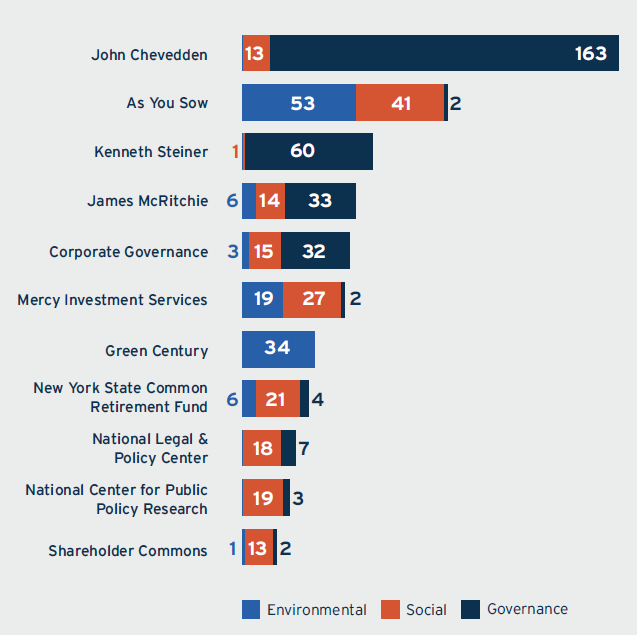
*Amounts represent number of proposals where the proponent is listed as the lead filer or co-filer. Proposals may be double counted given coordination among these proponents.
Shareholder Proposals
There also appears to be a notable increase in so-called “conservative” proposal submissions this season that are often critical of the evolving ESG landscape. Based on our examination of three primary proponents of these proposals—Steven Milloy, The National Legal and Policy Center and the National Center for Public Policy Research, the number of such proposals increased from 26 in 2021 to 52 in 2022.
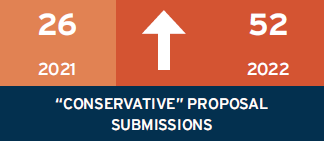
2021—2022 YTD Average Support by Proposal Category; Average Support Excluding Outlier Proponents*

*Outliers for purposes of this chart refers to systems-related proposals and proposals filed by “conservative” proponents.
Say on Pay
Say-on-pay vote results for 2022 season YTD are witnessing a marginal decline in the average support for Russell 3000 companies, with approximately 90.2% of votes cast in favor (excluding abstentions), compared to 91% support in 2021. As we have been seeing in recent years, S&P 500 companies have garnered slightly lower support, with approximately 87.8% of votes cast in favor YTD, also down slightly from 2021 when they received 88.5% favorable support.

35 Russell 3000 companies have failed to receive majority support for their say-on-pay proposals so far in the 2022 season, with 27 failed votes occurring since January 1, 2022. Nearly one-third of these companies are in the S&P 500 index, with 12 failed votes in 2022 YTD and 9 since January 1, 2022. These nine S&P 500 companies that failed to receive majority support are D.R. Horton, CenterPoint Energy, Centene Corporation, Ventas, Global Payments, Paycom Software, CME Group, Wynn Resorts and Intel Corporation. CenterPoint Energy received the lowest support, with only 22.2% support. The sizable retention grant to the CEO, which is entirely time-based and also vests after a relatively short period of time, seems to have contributed to significant shareholder opposition. Additionally, 4.8% of Russell 3000 companies 2022 YTD have had say-on-pay “red zone” voting results—i.e. vote support falling between 50% and 70%. By comparison, 6.4% of S&P 500 companies so far have results falling within the “red zone.”
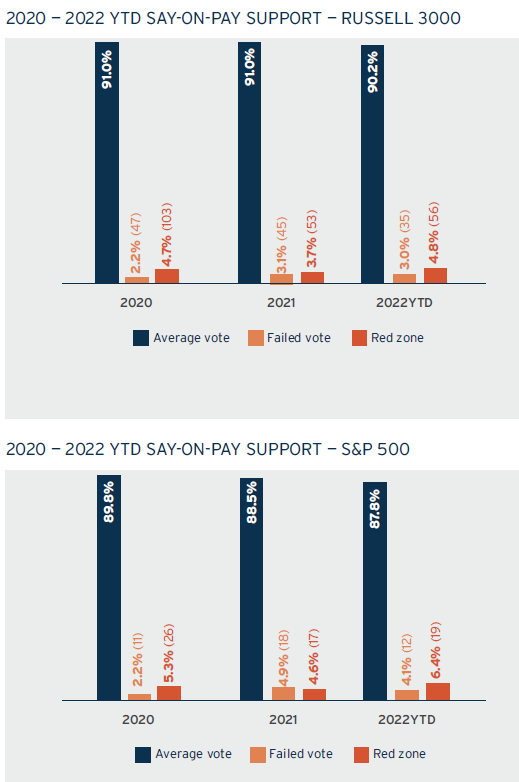
Director Elections
ISS’s negative recommendations at Russell 3000 companies during the first 4 months of the year in 2022 were comparable to the same period in 2021, at approximately 9.3%. Negative ISS vote recommendations may have reduced shareholder support by as much as 36.1% of votes cast at such companies during this period in 2022, compared to 38.0% in 2021. ISS has recommended “Against” a slightly lower percentage of S&P 500 companies for the period from January 1 through April 30, 2022, with 11.5% of say-on-pay proposals garnering a negative recommendation, compared to 13.7% for the same period in 2021. The impact of ISS’s negative versus favorable recommendation during these 4 months has been 36.4% in 2022 compared to 39.2% in 2021.
In assessing pay for performance alignment in 2022, a common concern for both shareholders and ISS seems to relate to goal rigor of incentive programs, as some companies have lowered targets following challenging business conditions due to the ongoing pandemic. ISS has particularly scrutinized maximum or above target payouts where targets were lowered compared to last year, or where there has been inadequate disclosure of how companies determined award payouts. As ESG metrics are increasingly used in incentive compensation, proxy advisory firms and investors are asking for enhanced disclosure relating to use of such metrics and achievement against the related goals. Among poor pay practices, retention grants without performance conditions or additional compensation without adequate justification are seen as being especially problematic.
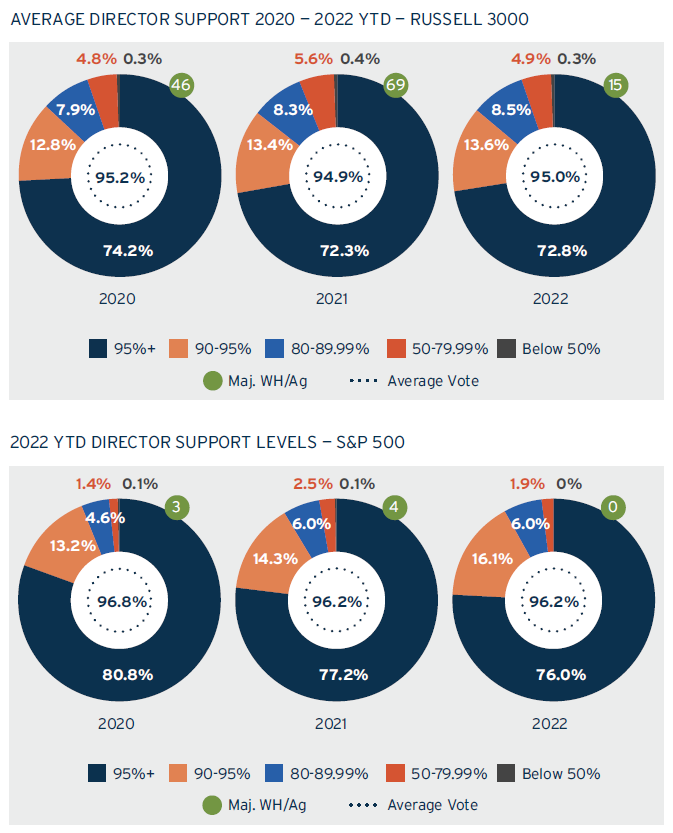
As for areas of focus driving investors’ director election decisions, board composition and oversight appear to continue to be at the top of the list in the 2022 proxy season. Racial and ethnic diversity expectations are likely contributing to the slight increase in opposition observed. Significantly, as ISS’s and many investors’ policies to hold nominating committee chairs/members accountable where their boards lack of racially and ethnically diverse members went into effect this year. Glass Lewis and many investors have also increased their board gender diversity expectations, from one to at least two women on the board. Relating to oversight, both proxy advisory firms and some investors have also increased expectations as to how boards should oversee material environmental and social matters and companies’ sustainability disclosures, especially those relating to climate change. Lastly, overboarding continues to result in director opposition, as investors increasingly tighten their policies relating to directors’ time commitments.
Vote No campaigns—Majority Action
Vote No campaigns continue to gain momentum in 2022, with Majority Action filing what appears to be the largest number of exempt solicitations in its history. At the time of writing, 14 companies targeted by Majority Action had held their annual meetings. Director elections support across those 14 companies suggest that directors targeted by Majority Action received an average of approximately 245 basis points lower support compared to company peers. Of the 14 companies that have held annual meetings in 2022 thus far, 10 are repeat Majority Action campaigns from 2021. In 2021, Majority Action-flagged directors at these 10 companies had lower average support of approximately 425 basis points.
Shareholder Proposals: Environmental
Climate remains a key focus in the 2022 proxy season, and the various environmental shareholder proposals showcase heightened proponent ambitions. Year-over-year, submissions of environmental proposals increased 39%, with 172 proposals submitted during the 2022 season compared to 124 during the 2021 season. Despite the increased volume of submissions, early voting results suggest dampened support. At the time of writing, we have observed six environmentally focused shareholder proposals pass, representing a passage rate of approximately 20%. While this initial passage rate suggests somewhat weaker support relative to 2021, we view this less as a matter of decreasing shareholder support and more the result of heightened ambitions in this year’s proposals, as discussed further below.
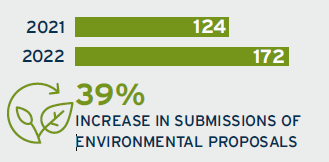
Emissions reduction targets
Like 2021, shareholder proposals calling for companies to adopt or enhance greenhouse gas (GHG) emissions reduction targets represent the most common environmental sub-category this season. However, this year’s proposals often request for targets or strategies that specifically include or account for Scope 3 emissions. Of the 71 submitted proposals related to GHG reduction strategies or targets, at least 56 specifically request inclusion of Scope 3 emissions. [1]

To date, we note that 31 of the 56 Scope 3 proposals have been withdrawn, and 12 have been voted upon. Of the 31 proposals that were withdrawn, 23 specifically reference withdrawal due to an agreement being reached, a commitment being made, or general constructive dialogue. Notably, As You Sow was listed as a filer in 17 of the 31 withdrawn proposals. Turning to proposals that were brought to a vote, of the 12 proposals voted upon, eight failed and four passed. Further, of the four that passed, in one instance management recommended that shareholders vote in favor of the proposal, and in another management did not make a recommendation with respect to how shareholders should vote on the proposal.
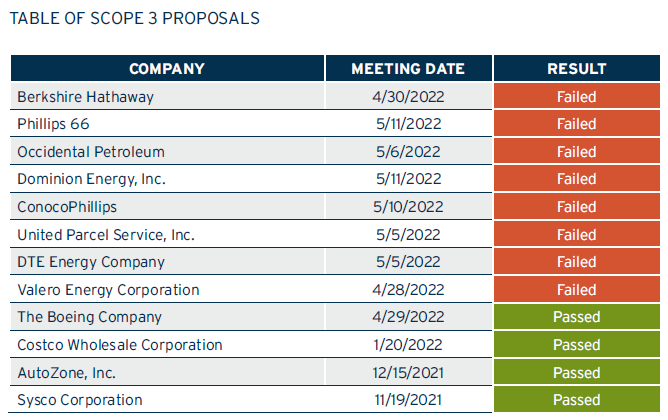
No New Fossil Fuel Financing
Several environmental proposals within financial services have focused on financing policies, requesting companies to cease financing fossil fuel projects. At the time of writing, we have observed 14 of such proposals filed across 12 companies. [2]
Most proposals within this category (13 out of 14) reference the International Energy Agency’s (IEA) Net Zero by 2050 scenario. In this context, these proposals request that the subject company refrain from financing or underwriting activities that would be inconsistent with said scenario. In practical terms, these proposals effectively call for an end to the financing or underwriting of new fossil fuel projects. At the time of writing, we have observed results for seven such proposals, with all seven failing to pass and none receiving support above 12.8%, as shown below.
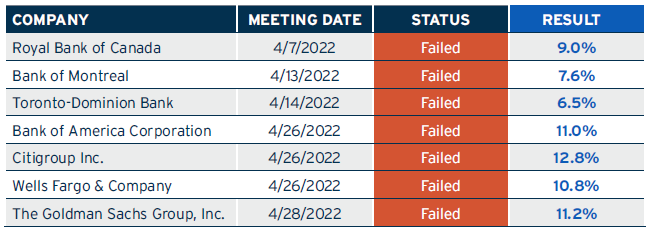
The results displayed utilize the relevant method of calculating votes for determining whether the proposal has been approved.

Audited Report on Impact of IEA’s Net Zero by 2050 Scenario
In addition to the aforementioned proposals regarding financing policies, we have also seen IEA’s Net Zero by 2050 scenario referenced across companies within the energy and utility sectors. In these proposals, proponents request companies to issue audited reports on the impacts of the IEA’s Net Zero by 2050 scenario, including how applying the scenario’s assumptions regarding fossil fuel demand would impact each company’s underlying assumptions and financial positions. At the time of writing, we have observed six proposals within this category, four of which have been withdrawn. The remaining two proposals are on the proxy statements at Chevron and ExxonMobil, both of which have meetings scheduled for May 25th. We note that preliminary results from ExxonMobil’s annual meeting suggest that this proposal has passed, though final results were not available at the time of writing.
BlackRock’s Bulletin on 2022 Climate-related Proposals
We expect many of the early voting trends on climate proposals to persist throughout the remainder of the season, a sentiment that was bolstered following BlackRock’s recently published commentary regarding 2022 climate-related proposals. In the bulletin, BlackRock characterizes this year’s climate proposals as more prescriptive than 2021’s proposals and notes that “[t]he nature of certain shareholder proposals coming to a vote in 2022 means we are likely to support proportionately fewer this proxy season than in 2021, as we do not consider them to be consistent with our clients’ long-term financial interests.” [3]
BlackRock flags specific categories of proposals that they believe warrant special attention. These themes include:
- Ceasing providing finance to traditional energy companies
- Decommissioning the assets of traditional energy companies
- Requiring alignment of bank and energy company business models solely to a specific 1.5°C scenario
- Changing articles of association or corporate charters to mandate climate risk reporting or voting
- Setting absolute scope 3 GHG emissions reduction targets
- Directing climate lobbying activities, policy positions or political spending
Consistent with its commentary on climate-related proposals, and promptly thereafter, BlackRock published a vote bulletin summarizing the rationale for its vote against a shareholder proposal requesting the Bank of Montreal to adopt a policy to ensure financing consistent with the IEA’s Net Zero by 2050 scenario.
In the bulletin, BlackRock notes the proposal is “overly prescriptive, unduly constraining on management and board decision-making, and would limit the company’s ability to support an orderly energy transition.” Throughout the bulletin, BlackRock emphasizes its role as an asset manager, noting: “It is not BIS’ position to tell companies what their strategies should entail, as this proposal prescribes. Rather, we assess, based on their disclosures, their climate action plan, board oversight and business model alignment with a transition to net zero by 2050.”
Pre-disclosing Voting Decisions
We’ve seen the trend of investors pre-disclosing voting decisions continue in 2022, with more investors providing voting rationales in advance of N-PX filings. While BlackRock and Neuberger Berman have historically led this effort, we have seen an uptick from investors such as Engine No. 1 and AllianceBernstein. Given the voluntary nature of such disclosure, there are differences in the consistency and timing of these publications. For example, Neuberger Berman often provides voting rationale in advance of an AGM, whereas BlackRock generally publishes its rationale shortly after the AGM but well in advance of N-PX filings.
Shareholder Proposals: Social
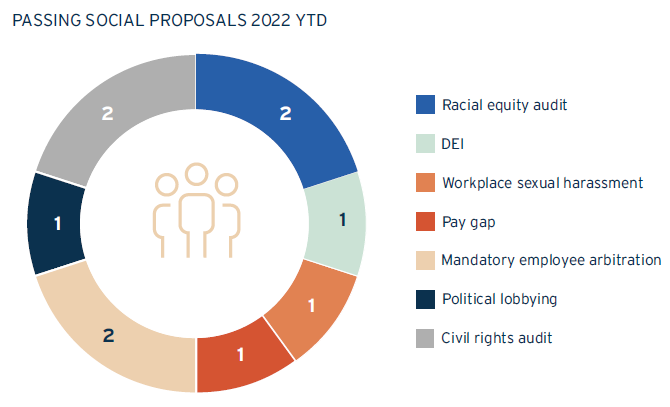
Diversity, Equity & Inclusion
Consistent with the 2021 shareholder season, diversity equity and inclusion remains a major theme for shareholders in 2022, with 50 proposals identified. The variety within proposal resolutions relating to DE&I matters is illustrative of the variety of ways that investors believe DE&I matters can be material to companies. One notable trend is the growth in shareholder proposals seeking reporting on workforce data beyond disclosure of EEO-1 survey workforce diversity data. Data requests this year included disclosure of recruitment, retention, and promotion information specifically addressing diverse employee populations, or reporting on steps by the company to implement their stated diversity and inclusion initiatives. So far this season 25 proposals have been withdrawn and 6 have gone to a vote. 1 such proposal has passed. Average support has been 36% for these proposals. 17 proposals remain pending as of the writing of this post.
As for EEO-1 reporting, proposals seeking such disclosure decreased dramatically in 2022 compared to 2021 (7 vs 47), and all but two such proposals have been withdrawn. The one pending proposal is critical of such diversity reporting and may attract modest support. We believe the decline in the number of such proposals does not represent a decreased demand for workforce diversity data, but rather is an indication of the rapid increased prevalence of this disclosure, particularly across S&P 500 companies.
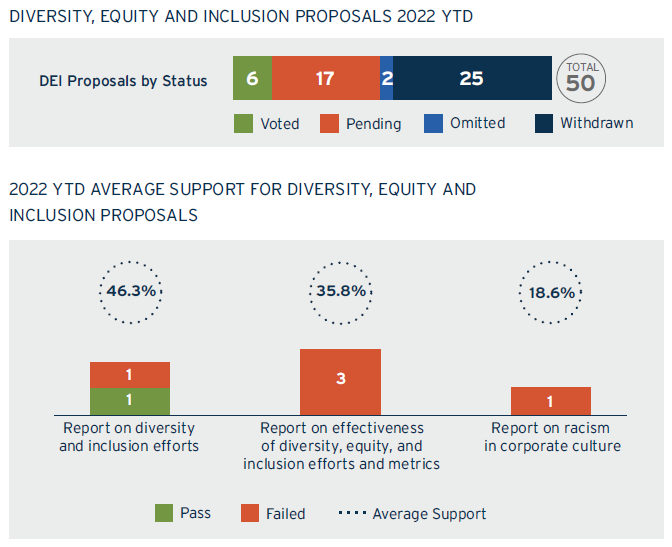
Board Diversity
An additional 18 proposals filed this year addressed board diversity matters, a slight decline as compared to the 2021 season. As with EEO-1-related proposals, we believe this decline in proposal volume is not indicative of waning importance of this topic, but rather an indication of progress. Many companies have made meaningful strides in diversifying their boards—and providing disclosure thereon, whether as a result to Nasdaq’s recently revised listing standards or otherwise—and institutional investors have increasingly revised proxy voting guidelines to provide for votes against directors where companies fall short of their diversity expectations.
Civil Rights and Racial Equity Audits
Another subject of shareholder proposals that was new in 2021 were those relating to racial equity audits, which were largely (although not exclusively) focused within the financial services sector. This year, these proposals have been expanded upon to include civil rights audits and proponents have submitted them across several industries. Such proposals typically focus on both internal and external procedures at the company that may negatively impact minority or protected groups. While no proposals on this topic passed in 2021, so far in 2022 two racial equity and two civil rights audit proposals have passed. Average support across both types of proposals is 31%; however, when adjusted to exclude the results of four “conservative” outlier proposals (none of which received more than 3% support), average support increases to 42%. One proposal seeking an environmental justice audit is outstanding as well. Like the racial equity and civil rights audits, this proposal considers the company’s impact on communities of color.
Workforce Harassment/Mandatory Employee Arbitration
Concern around risks posed by workplace harassment also seems to have increased among shareholder proponents, with both proposal submissions on this topic and the number going to a vote increasing year-over-year. So far this year one proposal on sexual harassment has passed and two proposals on the use of binding arbitration provisions within employment contracts have passed. Critics contend that binding arbitration within employee contracts may pose a barrier to an employee’s ability to make known harassment or discriminatory practices occurring within a company’s workplace. In the case of both proposal types, we believe these represent the first such proposals to have passed. Further, average support for proposals related to workplace harassment and mandatory arbitration voted upon to date was 54%, a meaningful increase compared to average support of 45% for such proposals in the 2021 season.
Pay-Gap
While pay gap proposals have appeared on proxy ballots for several seasons, 2022 marks the first time that such a proposal passed to our knowledge. Typically, these proposals seek reporting on any pay discrepancy that exists between minority groups or women and the average pay within a company. In 2021 no pay gap reporting proposals passed, and average support was below 30%. So far this season one such proposal has passed and average support across the 5 voted upon has increased to 37%. A number of proposals asking companies to conduct a pay gap analysis remain to be voted upon as of the date hereof, as do a series of proposals that relate to paid leave.
All paid leave-related proposals were either omitted or were withdrawn in 2021 and YTD only one such proposal has gone to a vote.
Covid-19/Drug-Related
With the pandemic now entering its third-year, vaccine access remains a focus for shareholder proponents in 2022. 12 proposals were filed with healthcare companies relating to intellectual property and vaccine access. Across the 9 proposals voted on thus far in 2022, none have passed, consistent with 2021 results. Average support for these proposals has been relatively unchanged year over year

Human & Labor Rights-Related
Thus far 13 human rights related proposals have been voted on in 2022. These 13 proposals relate to how companies manage or address human rights or labor rights issues within their direct operations or value chains. Average support across the proposals has been 25%, in line with average support in 2021 (excluding the one passing proposal on this topic in 2021, which was supported by management). We note that three “conservative” proposals in this category voted upon to date are negatively impacting average support for 2022; adjusting for these outlying proposals, average support increases to 27%. This could indicate that shareholders’ willingness to support human rights-related proposals is increasing. However, approximately 24 such measures remain outstanding, and accordingly the average support for these proposals could shift meaningfully before season end.
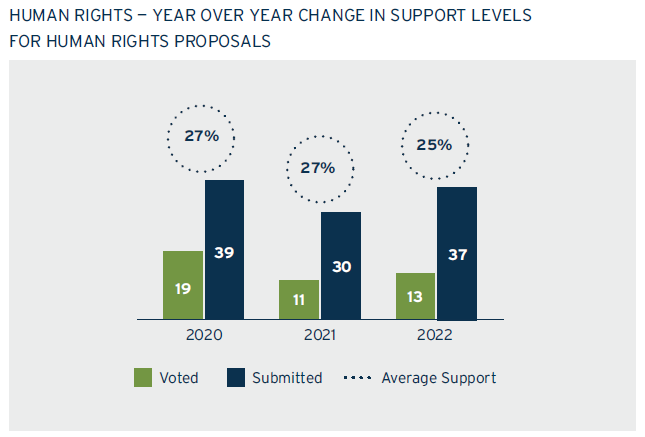
Shareholder proponents have stayed fairly consistent in their requests year-over-year, with the majority of proposals focusing on human rights due diligence or risk assessment processes of companies. However, some proposals this year do identify company-specific risks. Notably, of the proposals that remain outstanding, at least 2 relate in some way to human rights matters within conflict-affected areas. The topic has received renewed media attention following Russia’s invasion of Ukraine. State Street Global Asset Management (SSGA) took the unique step of issuing mid-season guidance on this topic, providing more context on what they expect of companies operating in areas where geopolitical risks may create material risk for a company. In their note SSGA stated they expect detail on:
- Management and mitigation of risks related to operating in impacted markets, which may include financial, sanctions, regulatory, and/or reputational risks, among others
- Strengthened board oversight of these efforts; and
- Detail on these efforts in public disclosures [4]
While not explicitly mentioning Russia, it is fair to assume that this statement was in response to the geopolitical risk created by Russia’s invasion in Ukraine. The guidance follows other actions in response to the conflict—by SSGA and other asset managers—which have included withdrawal of business operations from Russia. It remains unknown how investors will respond to the conflict-related human rights risk proposals. However it is clear that the Russian invasion has increased investors’ collective awareness and focus on how geopolitical conflicts may pose myriad risks to companies.
Further, at least 6 proposals cite alleged exploitation of the Uyghur minority population in China as a human rights issue relevant to the companies in question. There are also a series of new proposals this year filed within the technology sector that relate to how technologies, such as Meta’s (formerly Facebook’s) virtual reality platform (“the Metaverse”) or Google’s algorithms may inadvertently cause or enable human rights impacts.
Worker Classification
Another new shareholder proposal type this year addresses the risk posed to retailers by third-party logistics providers who may have misclassified their truck drivers as independent contractors rather than employees. The proposals hinge on a new California law that extends liability to logistic providers for the treatment of drivers they employ. All three of such proposals expected to be voted upon in 2022 remain pending as of the date of this post.
Political Lobbying and Contributions
As in previous years, political spending continues to be a major theme of shareholder proposals. In 2022 political spending accounted for 26% of all the estimated 399 social shareholder proposals filed. This represents an increase compared to 2021, where political spending proposals accounted for roughly 23% of social proposals filed.
On the other hand, average support for political contribution proposals has dropped from 40% average support in 2021 to 26% average support in 2022. So far this year no political contribution proposals have passed, compared to 6 passing in 2021. However as many as 13 political contribution proposals remain outstanding. How they perform could meaningfully influence the average support level and passage rate for 2022.
Political spending has also proven to be another area where proponents are exploring additional racial justice-related themes in 2022, namely environmental justice. At least 3 shareholder proposals were filed questioning how companies’ political contributions align or conflict with stated racial justice commitments. Climate-focused lobbying proposals also continues as an area of focus in 2022. Submission volumes for climate lobbying proposals were up year-over-year, with 16 proposals filed in 2022, compared to 12 in 2021. Note that we have categorized these proposals as environmental, and therefore included them within the number of environmental proposal submissions discussed above.
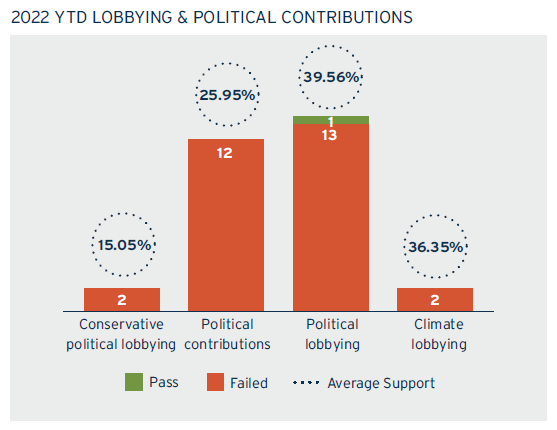
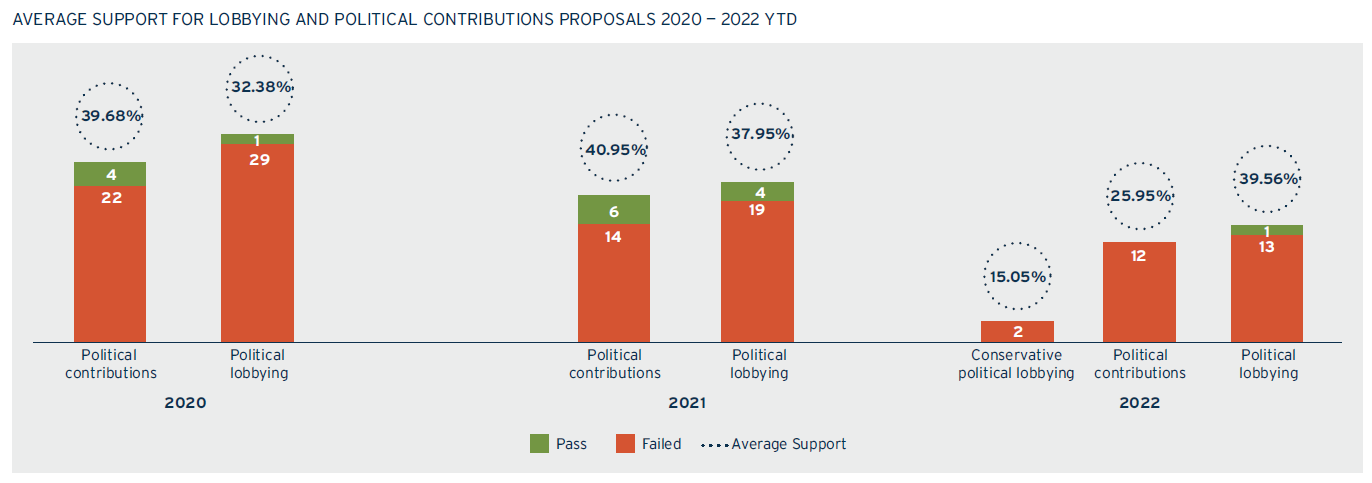
System Stewardship
Proposals related to system stewardship, spearheaded by The Shareholder Commons, represent another new proposal type for the 2022 proxy season. There are 21 such proposals across a wide range of environmental, social and governance topics (and bucketed across all categories), such as environmental racism and wage inequality. These measures share a common theme in requesting that subject companies address what the proponents contend are externalities of a company’s practices pose systemic risks to broadly diversified shareholders. Rather than focus on a company specific risk, these proposals focus on the risk that companies’ practices pose to the broader market, an approach that highlights perceived risks due to the proponents’ diversified portfolios. Support for those voted upon to date has been relatively low, although three have crossed the 10% threshold necessary to be eligible for resubmission in the 2023 proxy season.
Shareholder Proposals: Governance
The volume of governance-focused proposals appears to have decreased in 2022, with 353 proposals filed as compared to 392 in the 2021 season. Of the 149 proposals voted upon to date, 28 have passed. Many of the topics addressed by these proposals are perennial and not particularly remarkable.
While submission volume is down across the governance category, the number of special meeting-related proposals submitted more than doubled year over year, with 110 such proposals filed in 2022, compared to 41 in 2021. Accordingly, the number of special-meeting related proposals that have passed YTD in 2022 (7) has already exceeded the number passing in the 2021 proxy season (4), with as many as 51 still awaiting a vote as of the date hereof.
Within the sub-category of ESG-linked compensation proposals, one notable development this season is a number of new proposals leveraging companies’ CEO pay ratio information. These proposals request that companies take broader workforce compensation into consideration when setting target CEO compensation. This strikes us as an interesting development—while CEO pay ratio disclosure has been a requirement since 2017, it has received relatively little attention from proponents (or otherwise) since enactment. To date, it appears that 13 such proposals were filed; of the three voted upon so far this season, support ranged from just under 8% to nearly 11%. Considering this relatively low support YTD, it remains to be seen if this will be a continued area of focus in subsequent seasons. Anecdotally, we note that Carl Icahn emphasized CEO pay ratio as an area of concern in his campaign against Kroeger, which focuses on animal welfare and fair wage practices.
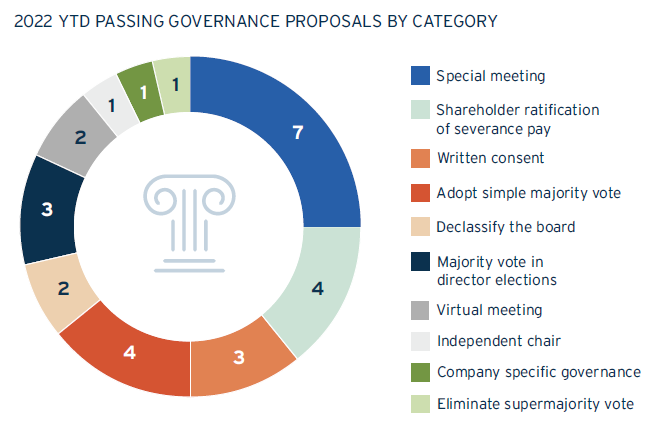

During the 2021 season, we saw 18 proposals filed, 14 of which were voted upon, seeking amendments to companies’ articles of incorporation to become public benefit corporations, which in all but one case—where support approached 12%—failed to receive support in excess of 4%. Given the extremely low rate of support, we see these proposals have dramatically tapered off in the 2022 season, with only 4 such proposals filed, 2 of which appear to be “conservative” proposals filed at companies that signed the Business Roundtable Statement of the Purpose of a Corporation, where the proponent argues that such companies’ incorporation as conventional Delaware corporations contradicts the commitments of the Business Roundtable statement. Of the three voted upon to date, support continues to be extremely low, ranging from 1.1% to just over 3% respectively. We note that the main proponent of these proposals in the 2021 season was The Shareholder Commons, which is focusing its efforts this season on the system stewardship proposals discussed within the Social section of this post.
The topic of separation of the roles of board chair and CEO also continues to be a focus in 2022, with 51 such proposals submitted, a slight increase from the 43 submitted in the 2021 season. To date this season, one such proposal has passed, compared to none in the prior season. Interestingly, this topic appears to be one area where mainstream and ESG critics align, as the National Legal and Policy Center is the proponent of 7 of these proposals this season, which appear to advance the same arguments in favor of separation of the two roles as do other proponents.
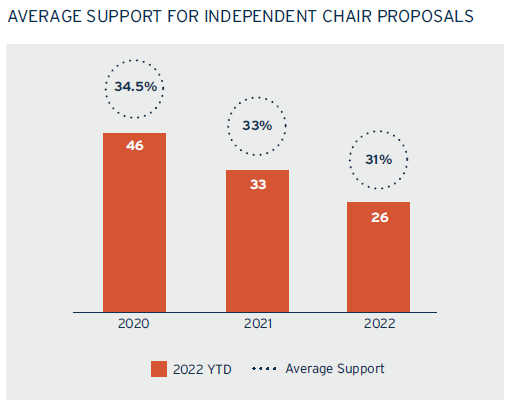
Conclusion
Unlike prior proxy seasons, the 2022 proxy season so far is characterized by increased scrutiny towards ESG matters. While this scrutiny has been evident in recent seasons through anti-ESG shareholder proposals, it may be expanding. Much of this newfound attention—from state pension funds and politicians alike—focuses on ESG’s impact on voting and investing decisions. States like Texas, Utah, and West Virginia have made public statements suggesting that ESG’s influence on fossil fuel companies is inappropriate. Further, on May 18th, legislation was introduced in the Senate calling for asset managers to make client voting choice available to individual investors in passive funds when the asset manager owns more than 1% of a company’s voting securities. [5]
This increased attention has created tension between asset managers and asset owners, some of whom believe that managers are not doing enough to advance ESG goals, while others believe that ESG expectations for public companies are becoming overly prescriptive. This tension may be a driver behind some of the recent pullback in support of proposals from asset managers like BlackRock, who characterized many of this year’s climate-related proposals as overly prescriptive and questioned whether certain proposals would promote long-term shareholder value. With several weeks remaining in the 2022 proxy season, including the “peak” weeks of May 16 and May 23, ultimate voting outcomes remain unknown. As of the date hereof, 286 proposals have been voted upon, and 335 remain pending. Accordingly, it remains to be seen whether the number of shareholder proposals passing in 2022 will surpass the record-breaking levels experienced in the 2021 season. Regardless, a dramatic increase appears unlikely. Once the 2022 season is complete, we expect shareholder proponents and advocacy groups will heavily scrutinize individual investors’ voting decisions.
The complete publication, including footnotes, is available here.
Endnotes
1This includes the Net Zero Indicator proposal filed at Boeing, which provides: “Shareholders request the Board issue a report, at reasonable expense and excluding confidential information, evaluating and disclosing if and how the company has met the criteria of the Net Zero Indicator, including scope 3 use of product emissions, or whether it intends to revise its policies to be fully responsive to such Indicator.”(go back)
2Three of the 13 companies referenced are not part of the Russell 3000 (Bank of Montreal, Royal Bank of Canada and Toronto-Dominion Bank). These proposals and results are included within this narrative for reference purposes, but are not part of the aggregated data set of R3000 proposals.(go back)
3BlackRock’s 2022 Climate-Related Shareholder Proposals More Prescriptive Than 2021 is available at https://www.blackrock.com/corporate/literature/publication/commentary-bis-approach-shareholder-proposals.pdf(go back)
4State Street’s Framework for Stewardship in the Context of Geopolitical Risk Arising from Unexpected Conflict Between or Among Nations is available at https://www.ssga.com/library-content/pdfs/global/framework-for-stewardship-in-context-of-geopolitical-risk.pdf(go back)
5In October 2021, BlackRock announced client choice voting for certain institutional accounts as the first in a planned series of steps to expand its clients’ abilities to make proxy voting decisions. Based on our experience so far, we have not observed a significant change in BlackRock’s voting activity as a result of this change.(go back)
 Print
Print